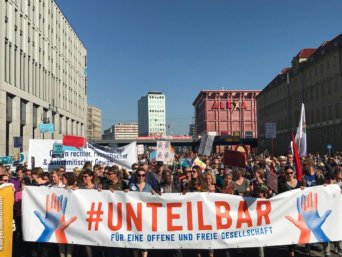- About
- Topics
- Story
- In-Depth
- Picks
- Opinion
- News
- Donate
- Signup for our newsletterOur Editors' Best Picks.Send
Read, Debate: Engage.
| located: | Germany |
|---|---|
| editor: | Gurmeet Singh |
Chemnitz. Koethen. Dresden. Leipzig.
The far-right is back. It’s undeniable. You can hear the stomping of jackboots, right out of history, right back onto our streets, on the news, carrying political opportunists and populist demagogues right into political power.
Although it’s correct that the far-right is once again ascendant, it’s a misconception that they’re dominating. There are indeed continental issues: South America seems to have swung back into a far-right pusillanimity, and much of Eurasia seems to be in some kind of nationalistic frenzy. Indeed, with Donald Trump at the helm of the world’s most powerful nation, and with the media uncritically reproducing the narrative that the “far-right are on the rise without resistance” (and thereby emboldening extremists), the fact that there is a widespread and vociferous resistance is often lost.
The recent gathering of hundreds of thousands of protesters in Berlin should go some way in challenging this narrative.
Last weekend, over 240,000 people gathered to march in the centre of the German capital. They demonstrated under a broad anti-far-right, pro-civil society banner. The name adopted to express such social solidarity was “Unteilbar”, or “Indivisible”.
The spirit of the march was clear for all to see and hear: together, we can stand against racism, xenophobia, hatred and also such socially-damaging and importantly, avoidable, phenomena such as high-rents with low-pay, forced evictions, deportations and structural violence. As always, the protesters stood against sexism, homophobia, transphobia and other prejudices, to show Germany and the whole world that the capital is free, open and loving.
This is called building solidarity with the people around you and the people you live with. Berlin has demonstrated that it stands against hate and division, and demands a stronger civil society. Such demands serve as a reminder to the international media, and also the world that we are in a position of power to fight the rising tide of hatred; but also, that we are ultimately responsible for the state of our society and civil discourse.
Top-down politics in technocracies are failing to find solutions to the challenges we as a society face. Not only do politicians get stuck in scheming (Horst Seehofer Theresa May are two good examples), but they also present limited visions for the future which only win by being the lesser of evils (see Macron, Merkel).
The idea that the people in charge know best is surely weakening. In the face of real hate, and the pantomime of national politics, it’s up to people to follow in the footsteps of Berliners and take to the streets and show the world what they believe. This means also taking charge of civil discourse and civil society and taking a lead on the issues those in power won’t, or can’t countenance.
Video: Bündnis #Unteilbar Youtube-Channel
